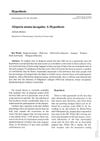Telogen Effluvium: An Etiopathogenetic Theory
May 1993
in “
International Journal of Dermatology
”

TLDR The paper suggests that telogen effluvium, a type of hair loss, may be a long-lasting condition triggered by stress or illness in people whose hair growth is unusually synchronized.
In the 1993 paper, Alfredo Rebora proposed a hypothesis to explain the pathogenesis of telogen effluvium (TE), a condition characterized by the shedding of hair in the telogen phase. Rebora suggested that TE could be a chronic condition, lasting years and often confused with androgenetic alopecia. The hypothesis posited that TE occurs when an insult, such as emotional stress or illness, strikes a scalp where a large proportion of hair follicles are synchronized in the same phase of the hair cycle, which is atypical for human hair that usually has individual cycles. This synchronization, or "animalization," could be caused by androgenetic alopecia, pregnancy, or long-term contraceptive pill use. The paper argued that the distinction between drugs causing hair to fall as dystrophic anagen or causing TE is not based on the drugs' pharmacologic characteristics but rather on the local condition of the scalp hair. The paper also noted that the coexistence of alopecia areata and androgenetic alopecia is rare, as the former requires a tuft of hair in a highly mitotic subphase for hair loss to occur, which is unlikely in a scalp affected by androgenetic alopecia.






